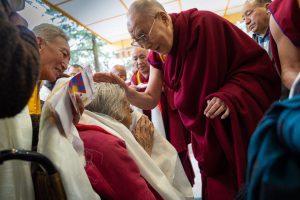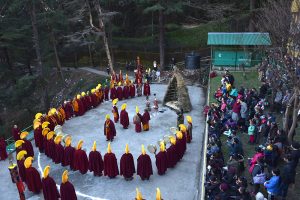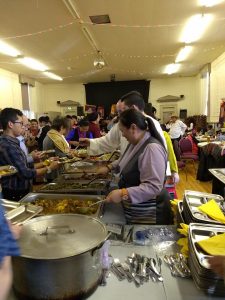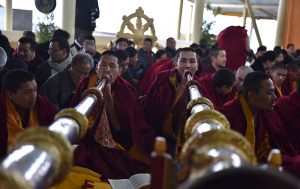
Photo/Tenzin Choejor/OHHDL
Losar celebrations occurred across the world on February 5, as Tibetans living in Chinese occupied Tibet, and those abroad or in exile, welcomed the New Year. His Holiness the Dalai Lama greeted Tibetans inside and outside Tibet with his Losar message, “Despite facing through a challenging period, we have successfully drawn admiration and recognition for the unique culture and religion of Tibet. This is chiefly due to the valour, courage and indomitable spirit demonstrated by Tibetans inside Tibet and the unity observed by all the Tibetans worldwide. Hence I wish to thank you all for preserving the unity of the three traditional provinces of Tibet.”
Losar has its roots in a winter incense-burning custom of the Bon religion which predated the arrival of Buddhism in Tibet. This custom merged with a harvest festival during the reign of the ninth Tibetan King, Pude Gangyal (617-698), to form the annual Losar celebration.

Monks from Namgyal Monastery in Dharamshala: fire puja, or Gutor
Photo/Tenzin Phende/CTA
Tibetan families prepared for the ceremony by cleaning their homes and preparing traditional foods – momos and khapsey – to be consumed for the special occasion. Many attended events where speeches were made and pilgrimages to the Gods of mountain and water were undertaken. Debts from the past year were settled, new clothes were purchased and quarrels were resolved.
Kyinzom Dongdue celebrated New Year in Sydney, Australia. Kyinzom stresses the importance of making offerings to the Buddha and the deities as a means to “let go of negativity and bringing in the New Year with good energy.” She feels, as a self identified “exile”, that each New Year is tinged with regret as she cannot celebrate in her ancestral homeland.
Tenzin Dorjee, a writer and activist living in New York, celebrated Losar by sharing his favourite Tibetan dishes, including Drokgyu (nomad meat sausage), Thenthuk (hand pulled noodles) and paneer chilli with his followers and friends.
In Arunachal Pradesh, India, Deputy Commisioner PN Thungon hosted a festival during which he explained the mythology of Losar and wished for a year of peace and harmony for all. A traditional dance was said to be one of the highlights of the celebration.
There were reports in the exile Tibetan media of restrictions on Tibetans in China during the festival. Police filled the streets of Lhasa and government workers were forbidden to visit monasteries. Chinese police are being deployed throughout the Tibet Autonomous Region to “assess the mood of the people” and ensure that any anti-Chinese sentiment does not lead to incidents.

Losar celebrations with the Tibetan Community in the north of England (UK)
Photo: Kate Murry
Complaints have been made in relation to the lack of time off being granted to Tibetans, limiting their chances of visiting family members who may be spread out across the region. An unnamed source stated that she had hoped to welcome her family from Chamdo to her home in Lhasa, but they had failed to receive holiday permission until the day before Losar, and by then the travel companies had all closed down.
Chinese state media Xinhuanet reported on Losar activities in Tibet. Their article described “many families on the Tibetan plateau” preparing “Qiema,” a two-tier rectangular wooden box painted with colourful decorative designs. Inside the box people put roasted barley, fried wheat, and tsampa. The Qiema box is placed on an altar for worshipping during Losar, alongside a bowl of water with barley seeds. Prayers for a good harvest are made in the presence of the Qiema.
The Xiunhuanet article also described events in Gatso Township, Tsonyi County, Tibet, about 5,000 metres above sea level and 1,000 kilometers from Lhasa, where 20 officials prepared dinner around a Tibetan-style coal stove. Sun Chao, deputy Party head of the township commented, “Both Tibetan and Han officials watched the Tibetan New Year gala and had guthuk, a traditional snack similar to a dumpling, last night.” The same article quoted Jigme Dorje, village head of Gangsha, Ngari, who alluded to progress made in recent years and a positive outlook for the future in his Losar message, “Our village has already shaken off poverty in 2017,” he said, “but the villagers will continue to work diligently to improve their living conditions in the new year.”

Monks from Namgyal Monastery, Dharamshala
Photo/Tenzin Phende/CTA
In Dharamshala, seat of the Tibetan Government-in-Exile, Tibetans and supporters gathered for celebrations in Tsugla Khan, the main temple in Dharamshala, with Losar greetings from the Governor of Himachal Pradesh, Hon Acharya Devvrat, and messages from the Kashag [Cabinet]. Sikyong Lobsang Sangay, President of the Tibetan Government-in-Exile, said, along with his Losar greetings to the Tibetan community, “Since this year is considered as the portentous critical year of His Holiness the Dalai Lama, Central Tibetan Administration urges all Tibetans to observe prayers throughout this year for His Holiness the Dalai Lama’s long and healthy life.”




 Print
Print Email
Email